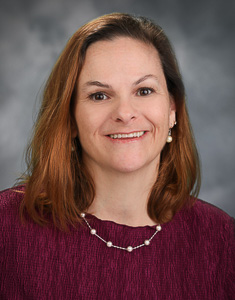Muckler, Falyar Named to Lead DNP Nurse Anesthesia Program

Chris Muckler, associate professor, has been named Director of the Doctor of Nursing Practice Nurse Anesthesia Program (NAP) at the Duke University School of Nursing, with Christian Falyar, assistant professor, as the new Assistant Director.
Muckler is a 2011 alumna of Duke’s DNP-NAP program. She came to the program after serving on active duty in the United States Air Force and working as a nurse anesthetist at Duke Regional Hospital. She is deeply involved in creating simulation-based educational experiences for students, within DUSON, nationally, and internationally. A dedicated teacher, she received the Didactic Instructor of the Year award from the American Association of Nurse Anesthetists (AANA) earlier this year.
Falyar came to Duke in 2018 after a long career as a clinical nurse anesthetist. He received his DNAP from Virginia Commonwealth University, and also served for 21 years in the Virginia Air National Guard. His research interests include using ultrasound imaging technology in nursing and nurse anesthesia.
Duke’s DNP-NAP is a rigorous, three-year program designed to train the nurse anesthetist leaders of tomorrow. Students learn how to bring cutting-edge research into clinical practice, how to measure patient outcomes, and how to transform health care systems for the better. 100 percent of graduates pass their CRNA exams and find employment. The program was ranked #3 in the nation by US News & World Report in 2018.
“We are honored to lead the Duke University Nurse Anesthesia Program, as the possibilities are endless,” said Muckler. “The talent our students bring to the program is remarkable.”
“We spend a great deal of time providing personalized mentoring to our students during their DNP Scholarly Projects, and contributing to the next generation of Certified Registered Nurse Anesthetists (CRNAs),” noted Muckler. “In the near future, they will not only deliver safe, efficient, courteous care, they will also become change agents for patients and health care policy, and outstanding clinical and didactic nurse anesthesia educators.”